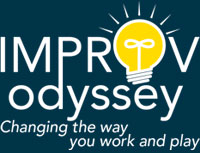Commentary on Spolin’s Tips and Pointers: Part 1
The Enlightened Teacher
I often re-read the section in Viola Spolin’s major work – Improvisation for the Theater, called “Tips and Pointers”. I always find inspiration and new insights every time I read through them. The wisdom contained in these little helpful hints is enormous and can be used to keep one focused on the true path Spolin’s philosophy reveals. Here are just three out of over 100 in the book. Taken from “Improvisation for the Theater” by Viola Spolin; 3rd Edition, Northwestern University Press.
Pointer #1 – Do not rush student-actors. Some students particularly need to feel unhurried. When necessary, quietly coach. “Take your time.” “We all have lots of time.” “We are with you.”
This deals with the common problem of urgency. Many students panic in an improvised scene because they get overwhelmed; they feel the need to move the scene forward; they feel nervous and judged (in their own mind) or they decide the scene is not working. When the head takes over, the player withdraws from the problem. Urgency is usually the first symptom.
Viola used to call, “No Urgency!” as another sidecoach when she recognized the players had something going on but the momentum of the scene verged on getting out of control.
I know for myself, when I heard her coach “We have all the time in the world”, I felt relieved: In many situations, I felt the need to “make something happen” because I was in a scene with others who seemed to me to “not get it”. I got urgent and tried to do more as a compensation for them. I realize now that I was in my head, (assuming they were not going to help the situation) disconnected from them, and abandoned them to my own need to make a good scene. Sometimes the scene went nowhere anyway, but, when I took my time, I had more presence of mind to ‘help my fellow player’ by playing with them rather than helping by playing for them. This is a common problem for me as a player. When I’m playing with others who I feel are playing well, this is not an issue.
Pointer #3 -Note that many exercises have subtle variations. This is important, and they should be understood, for each variation is solving a very different problem for the student. As you go through the work, you as teacher-director will find that you may make your own variations to solve problems.
This is a big note. I think that this point is where so many teachers go off and come up with games that are just different for the sake of being different. It’s not that Viola wanted to have everyone slavishly follow her games, but she was so thorough in creating games that solved so many on-stage problems, I find it aggravating that many students of hers went away with a wonderful training, but did not take with them, the complete understanding of the games they did play. Instead, people picked up other exercises that actually took people further into their heads and called it a ‘variation’ of Spolin exercises. A good example of this is the development of “Freeze Tag” which is not a Spolin game.
Pointer # 5 – How we do something is the process of doing (right now!). Pre-planning “How” makes process impossible and so becomes resistance to the focus of the exercise, and no “explosion” or spontaneity can take place, making any change or alterations in the student-actor impossible. True improvisation re-shapes and alters the student-actor through the act of improvising itself. Penetration into the focus, connection, and a live relation with fellow players result in a change, alteration, or new understanding for one or the other or both. In time, during the solving of the acting problem the student becomes aware of being acted upon and of acting, thereby creating process and change within his or her stage life. The intuition gained remains with the player in everyday life, for whenever a circuit is opened for anyone, so to speak, it is usable everywhere.
This note points to Spolin’s most important and valuable gift in Improvisation for the Theater – Transformation.
It also identifies the major block to achieving it – ‘How’. The need to please the teacher or any authority figure (even the internalized voices in your head that wants to make sure you get it right) leads to an overwhelming compulsion to do what is expected.
It is this need for approval and the satisfaction of the ego that Spolin seeks to erase. Unfortunately this drive to please the teacher/director has been so drilled into us that many of us are incapable of even noticing it. The programming is so strong, that it become a reflex. Many teachers, directors, consultants and trainers rely on providing the ‘how’. It’s an industry. We sell the idea of experts stepping in and showing you a better way instead of creating a situation for the student/seeker to solve the problem for themselves. This is what prevents enlightenment and robs us of our autonomy and perpetuates the Approval/Disapproval Syndrome.
This co-dependency is often so invisible to both student and teacher/coach/director/expert that it seems foreign to not relieve the anxiety created by showing ‘how one should do it’. It takes more time to work this way. (see Pointer #1) Improv students who satisfy the expectation of their teacher are considered to be ‘good improvisers’. Unfortunately no new ground can be covered while trapped in this relationship. The door to the unknown remains shut to both student and teacher. They remain where they are, comfortably fulfilling each other’s expectations.
Transcending this trap takes an enlightened teacher.


